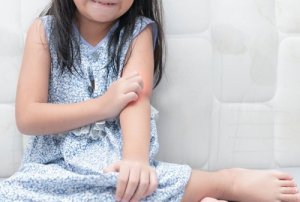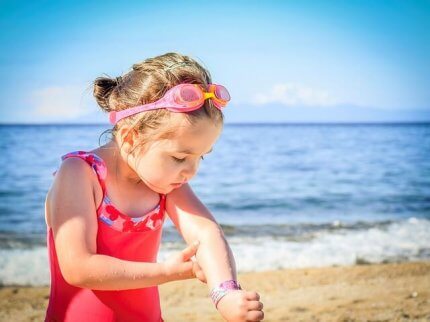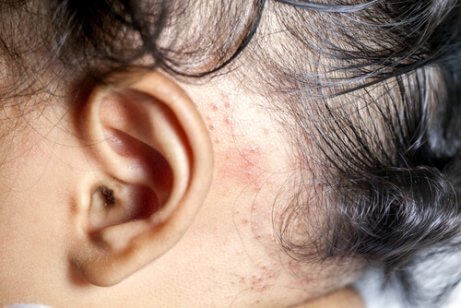How to Deal with Psoriasis in Children

Psoriasis a disease that affects both men and women. It typically affects 2 to 3% of the population. However, it’s pretty rare in children. In this article, we’ll try to explain psoriasis in children, what its symptoms are, and treatment and prevention options.
Psoriasis
Psoriasis is an inflammatory autoimmune skin disease. It’s characterized by scaly skin and redness. Although it isn’t contagious, it may be hereditary and chronic.
Typically, a healthy body produces normal skin cells every three to four weeks. Psoriasis makes these cells reproduce a lot more quickly, every 15 days or so. This means that that dead cells accumulate in the form of patches on the skin’s surface.
Psoriasis can affect any body part. However, it usually appears in the elbows, hands, stomach, or back.
In addition, it’s a very common condition. Although it usually manifests after adolescence, it can manifest at any age, which is why psoriasis may also occur in children.
Triggers

Sun exposure is one of the triggers of psoriasis in children.
Overall, some factors that can trigger a psoriasis outbreak or make it worse are:
- Bacterial, viral, or fungal infections,
- Trauma or skin injuries,
- Psychological factors, especially stress,
- Excessive exposure to sunlight (sunburn),
- Lack of sunlight (cold weather).
We recommend that you read: 6 Natural Remedies That Prevent Autoimmune Diseases
Clinical Manifestations of Psoriasis in Children
The clinical manifestations of psoriasis in children are often the same as in adults. However, the most common types of psoriasis in children are:
- Plaque psoriasis. This is characterized by red skin lesions covered with silvery scales. These lesions usually show up on the elbows, knees, and torso. They may also affect only the scalp.
- Guttate psoriasis. This is the most common type in children and young adults. It usually manifests after an infection in small, water-drop-shaped lesions on the torso and extremities. However, they can also affect the scalp.
- Inverse psoriasis. Although it’s uncommon in children, this type of psoriasis, known as “pediatric psoriasis,” is also included in this group.
Treatment of Psoriasis in Children

You should consult your pediatrician if you suspect your child is suffering from this condition or if there’s a family history of psoriasis, as they can prescribe the best treatment.
First, you need to see a doctor. Only a pediatrician will be able to diagnose psoriasis. From there, they can indicate the appropriate treatment. In general, the doctor may recommend therapy using moisturizers or other topical treatments (such as salicylic acid, for example).
In any case, you must bear in mind that psoriasis can manifest suddenly in patches and affecting a child’s self-esteem, especially if the psoriasis is widespread. Therefore, it’s very important to help the child overcome and accept the problem and support them psychologically. You must help boost their self-esteem.
In addition, it’s necessary to explain to your child that the treatment will benefit them and that the scales and discomfort may disappear, even if their condition is chronic.
You should read: Five Herbal Topical Psoriasis Treatments
Conclusion
Due to the fact that it’s an autoimmune disease and the many factors that can trigger it, it’s best to act quickly and prevent the triggers (stress, sunburn, skin lesions).
Overall, here are some final recommendations that may prove helpful:
- Use a very gentle bath or shower gel. In addition, make sure to rinse it off very well.
- Since the cold can worsen the condition, dress your child warmly with clothes made of natural fibers. Specifically, the most recommended are cotton garments.
- Follow the treatment prescribed by the doctor.
- Always consult your pediatrician before applying any natural remedy, especially in the case of children.
- Support your child at all times.
All cited sources were thoroughly reviewed by our team to ensure their quality, reliability, currency, and validity. The bibliography of this article was considered reliable and of academic or scientific accuracy.
- Lustia, M. M., Luna, P. C., Nocito, M. J., Soutelo, M. J., Posse, M. L. C., Marchesi, C., … & Mazzini, M. Á. (2009). Psoriasis: comorbilidades en nuestra población. Dermatología Argentina, 15(5), 340-343. https://dermatolarg.org.ar/index.php/dermatolarg/article/view/459
- Batista Romagosa, M., & Pérez Bruzón, M. (2009). Elementos más importantes en la patogenia de la psoriasis. Medisan, 13(3), 0-0. http://scielo.sld.cu/scielo.php?script=sci_arttext&pid=S1029-30192009000300009
- Mayo Clinic staff. (n.d.). Psoriasis. Clínica Mayo. https://www.mayoclinic.org/es-es/diseases-conditions/psoriasis/symptoms-causes/syc-20355840
- Alfonso-Valdés, M. E. (2012). Inmunopatogenia de la psoriasis. Impacto en las manifestaciones clínicas y el tratamiento de la enfermedad. Revista Cubana de Hematología, Inmunología y Hemoterapia, 28(4), 357-373. http://scielo.sld.cu/scielo.php?script=sci_arttext&pid=s0864-02892012000400005
- Defez, J. A., & Martínez, M. M. (2016). Psoriasis en la infancia y adolescencia. PediatríaIntegral, 234. https://www.pediatriaintegral.es/wp-content/uploads/2016/06/Pediatria-Integral-XX-04_WEB.pdf#page=28
- I. Vidal Olmo, A. Vicente Villa. (nd.). Psoriasis. Asociación Española de Pediatría. https://www.aeped.es/sites/default/files/documentos/psoriasis_0.pdf
This text is provided for informational purposes only and does not replace consultation with a professional. If in doubt, consult your specialist.








